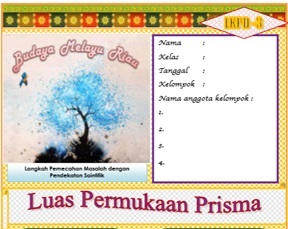
Development of Mathematics Learning Tools in the Context of Riau Malay Culture to Improve Students Mathematical Problem Solving Ability
Abstract
Keywords
Full Text:
PDFReferences
Akbar, S. (2013). Instrumen Perangkat Pembelajaran. Bandung: Remaja Rosdakarya.
Ariawan, V. A. N., & Pratiwi, I. M., (2017). Eksplorasi Kemampuan Siswa Kelas IV Sekolah Dasar dalam Penyelesaian Soal Cerita Matematika. Jurnal Pendidikan Indonesia, 6(1), 82-95.
Daulay, I. S., (2017). Peningkatan Kemampuan Pemecahan Masalah Matematis dan Motivasi Belajar melalui Pembelajaran Berbasis Masalah. Jurnal Pendidikan dan Kependidikan, 2(2), 81-99.
Dewi, N. W. D. P., Suharta, I. G. P., & Ardana, I. M., (2014). Pengembangan Perangkat Pembelajaran Matematika dengan Pendekatan Scientific Berorientasi Teknologi Informasi dan Komunikasi untuk Meningkatkan Kemampuan Pemecahan Masalah dan Penalaran Siswa. e-Journal Program Pascasarjana Universitas Pendidikan Ganesha, 3, 1-12.
Faiziin. (2014). Analisis Kemampuan Problem Solving Siswa Kelas VIII SMP IT Nurul Islam Yogyakarta Pada Materi Bangun Ruang Sisi Datar. Skripsi, Universitas Negeri Yogyakarta, Pendidikan Matematika.
Guswinda, Yuanita, P., & Hutapea, N. M., (2019). Improvement of Mathematical Problem Solving and Disposition Ability of MTs Students through Strategies Think Talk Write in Cooperative Learning in Kuantan Singingi Regency. Journal of Educational Sciences, 3(3), 377-389.
Hasanuddin. (2017). Etnomatematika Melayu: Pertautan Antara Matematika dan Budaya Pada Masyarakat Melayu Riau. Jurnal Sosial Budaya, 14(2), 136-149.
Heleni, S., & Zulkarnain. (2018). The Influence of Mathematical Thinking Ability with Modified MOORE Method on Learning Outcomes of Basic Mathematic II Chemical Education Students. Journal of Educational Sciences, 2(2), 33-41.
Novrini, Siagian, P., & Surya, E. (2015). Pengembangan Perangkat Pembelajaran Berorientasi Problem Based Learning Untuk Meningkatkan Kemampuan Visual Thinking Dalam Pemecahan Masalah Matematis Siswa Kelas VIII SMP. Jurnal Paradigma, 8(3), 84-97.
Nurjanatin, I., Sugondo, G., & Manurung, M. M. H., (2017). Analisis Kesalahan Peserta Didik dalam Menyelesaikan Soal Cerita Pada Materi Luas Permukaan Balok Di Kelas VIII-F Semester II SMP Negeri Jayapura. Jurnal Ilmiah Matematika dan Pembelajarannya, 2(1), 22-31.
Peraturan Menteri Pendidikan dan Kebudayaan Nomor 22 Tahun 2016. Standar Proses Pendidikan Dasar dan Menengah. Jakarta: Menteri Pendidikan dan Kebudayaan Republik Indonesia.
Putri, N. W. S., Sariyasa, & Ardana, I. M., (2014). Pengembangan Perangkat Pembelajaran Tandur Berbantuan Geogebra Sebagai Upaya Meningkatkan Prestasi dan Aktivitas Belajar Geometri Siswa. e-Journal Program Pascasarjana Universitas Pendidikan Ganesha, 3.
Rahmadi, F. (2015). Pengembangan Perangkat Pembelajaran Berbasis Pemecahan Masalah Berorientasi Pada Kemampuan Penalaran dan Komunikasi Matematika. Jurnal Pendidikan Matematika, 10(2), 137-145.
Rochmad. (2012). Desain Model Pengembangan Perangkat Pembelajaran Matematika. Jurnal Kreano, 3(1), 59-72.
Sari, S. M., Johar, R., & Hajidin. (2016). Pengembangan Perangkat Problem Based Learning (PBL) dalam Pembelajaran Matematika di SMA. Jurnal Didaktik Matematika, 3(2), 42-53.
Sugiyono. (2014). Metode Penelitian Kuantitatif Kualitatif dan R & D, Bandung: Alfabeta.
Yennita, Khasyyatillah, I., Gibran, & Irianti, M. (2018). Development of Worksheet Based on High-Order Thinking Skills to Imporove High-Order Thinking Skills of the Students. Journal of Educational Sciences, 2(1), 37-45.
Zulkarnain. (2011). Pengajaran dan Pembelajaran Matematik Melalui Soalan Berayat Berbentuk Kontekstual (PPMSBK): Penyelidikan Tindakan di Sekolah Rendahdi Provinsi Riau, Indonesia. (Disertasi) Fakulti Pendidikan UKM: Tidak diterbitkan.
Zulkifli, Nuh, M., & Dardiri. (2016). Etnomatematika Dalam Sistem Pembilangan Pada Masyarakat Melayu Riau. Jurnal Penelitian sosial keagamaan, 19(2), 220-238.
DOI: http://dx.doi.org/10.31258/jes.4.1.p.73-82
Refbacks
- There are currently no refbacks.
Copyright (c) 2020 Resmi Rianti, Sehatta Saragih, Zulkarnain Zulkarnain

This work is licensed under a Creative Commons Attribution 4.0 International License.
Publisher: FKIP Universitas Riau












